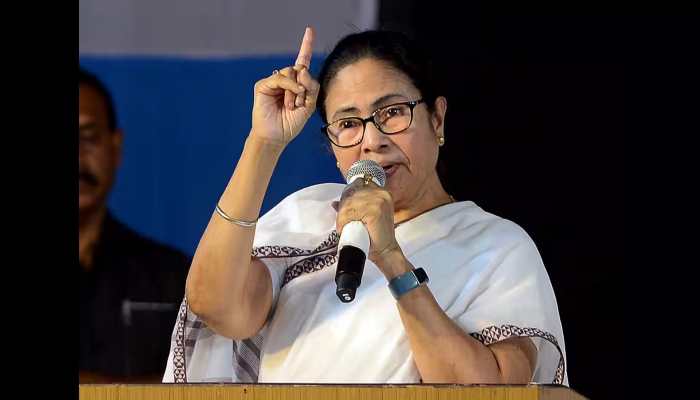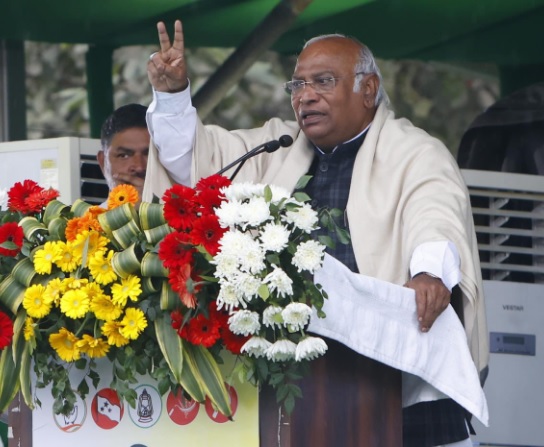Last Updated on December 12, 2024 10:32 pm by INDIAN AWAAZ
Mallikarjun Kharge, Mamata Banerjee and M.K. Stalin called it a threat to federalism, even as BJP allies hailed it as a step towards development
AMN / WEB DESK
The Union Cabinet’s approval of the One Nation, One Election (ONOE) Bill has sparked controversy across political spectrum. while BJP described it as a revolutionary step towards streamlining governance and boosting development, the proposal has been fiercely opposed by Opposition parties, which argue it undermines federalism and concentrates power in the hands of the centre.
The Bill aims to synchronise elections for the Lok Sabha, state assemblies, and local bodies and is expected to be tabled in the Parliament during the ongoing winter session.
While the BJP and its allies are pushing the idea as a significant reform, the Congress and other regional parties, have branded it as “anti-democratic” and a threat to India’s diverse political fabric.
Congress MP Jairam Ramesh said that the party would want the bill to be sent to a Joint Parliamentary Committee (JPC).”The bill will be presented in the Parliament and we want it to be sent to the JPC. The INC’s stand was made clear last year itself by party president Mallikarjun Kharge when he sent a four-page letter to former President Ram Nath Kovind’s committee on One Nation One Election…”
Congress President Mallikarjun Kharge had already articulated his party’s strong disapproval in January 2024, describing the concept as “anti-democratic.” The party’s deputy leader in the Lok Sabha, Gaurav Gogoi, accused the BJP of using the Bill to divert attention from critical issues. “There are many concerns among the INDIA bloc about the impact on the federal character of our country through this Bill,” Gogoi said, adding, “PM Modi has not walked the talk…he does Haryana and Maharashtra elections separately. He does Gujarat elections separately.”

TMC supremo Mamata Banerjee minced no words, calling the legislation a “draconian” attack on democracy. “Bengal will NEVER bow to Delhi’s dictatorial whims,” she declared. Her colleague Kunal Ghosh echoed her sentiment, raising doubts about the practicality of the move. “Who will give the guarantee that after voting once, a government will last for its full term, i.e., 5 years?”
Tamil Nadu CM M.K. Stalin launched a scathing attack on the Bill, labelling it “impractical” and “anti-democratic.” He warned that it would erase regional voices and disrupt governance. “Let’s resist this attack on Indian Democracy with all our strength!” Stalin wrote on X.
AAP Rajya Sabha MP Sanjay Singh dismissed the Bill as a ploy to benefit corporate interests, saying, “There’s only one slogan of the Modi government: ‘one nation, one Adani.’” Punjab CM Bhagwant Mann questioned the Centre’s sincerity, stating, “They cannot even hold ‘two states, one election.’ That means there must be something else in their mind.”
JMM MP Mahua Maji called it a conspiracy against smaller parties, asserting, “They want to finish off regional parties and want just 1-2 parties in the country.” Similarly, Shiv Sena UBT MP Priyanka Chaturvedi expressed scepticism about the logistics, saying, “How will it be implemented, what will be the expense, how many more EVMs will be installed…It is a long procedure.”
BJP ally Chirag Paswan was quick to hail the initiative as being in the “national interest,” emphasising its potential to minimise the disruptions caused by frequent elections. “It (simultaneous election) is in the interest of the country. It will boost development,” Paswan stated.
Assam chief minister Himanta Biswa Sarma endorsed the Bill, highlighting the logistical and financial efficiencies it promises. “Like simultaneous elections were held in Odisha…When assembly and Lok Sabha elections are not held together, development work stops,” Sarma argued.
Former President Ram Nath Kovind, who headed the high-level committee on the proposal, noted that 32 political parties supported the idea, while 15 opposed it. Yet, the stark divide among national and regional players reflects the complexity of reconciling simultaneous polls with India’s federal structure.
If the amendments fail to get parliamentary approval, the notification will become null and void. If the amendments are adopted, simultaneous polls will become a reality and the terms of most state governments will get truncated during the transition.
Once “One Nation, One Election” becomes a reality, say in 2029, if the Lok Sabha or a state Assembly gets dissolved before its term of five years because of a loss of majority on the floor of the House, the committee has proposed that fresh elections be held. These will be “midterm elections” and the new government will last only for the remainder of the full term of the Lok Sabha and its term will be called “unexpired term”.
If the Modi government decides to kickstart the process in 2034, the President will issue a notification on the day of the first sitting of the next Lok Sabha, as per the Kovind scheme, and the rest will be identical to what is discussed above, with truncated Assemblies between 2029 and 2034.

